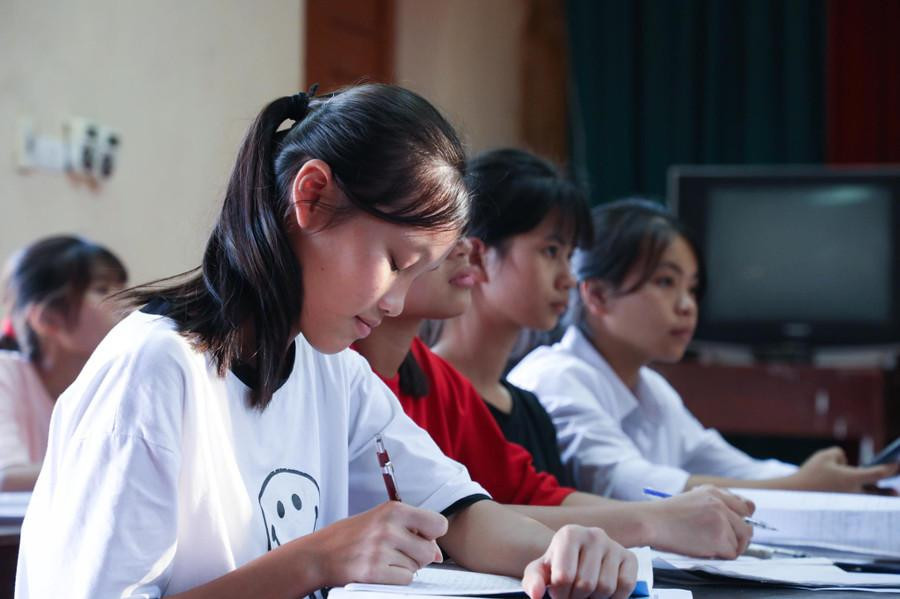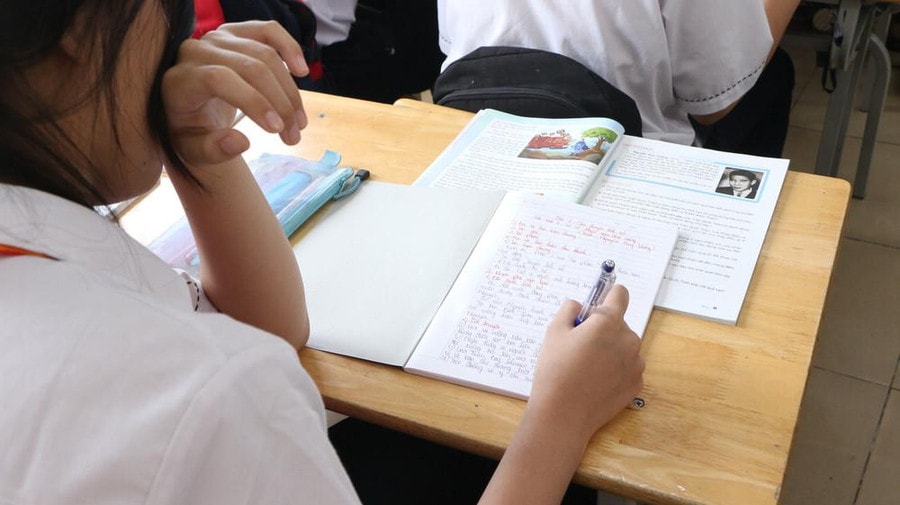Prohibit negativity in extra teaching, not prohibit the legitimate needs of teachers and students.
The draft on management of extra teaching and learning aims to prohibit negative phenomena; it does not prohibit the real and legitimate needs of teachers and students.
Associate Professor Dr. Nguyen Xuan Thanh, Director of the Department of Secondary Education (Ministry of Education and Training) shared this when discussing the draft regulations on the management of extra teaching and learning that the Ministry of Education and Training is seeking public comments on.
Associate Professor Dr. Nguyen Xuan Thanh affirmed: Extra teaching and learning are the real needs of both teachers and students. Good teachers will always have studious students who want to learn to develop their abilities.
The issue that is currently very pressing for public opinion is that teachers teach students at school, and then in one way or another “force” students to take extra classes that they themselves teach outside. In these cases, students and parents must “voluntarily”. This is an issue that the Department of Education and Training must find a way to manage.
Public, transparent, creating a mechanism for national supervision
-Draft regulations onmanagement of extra teaching and learningWhat are the notable new points, sir?
Associate Professor, Dr. Nguyen Xuan Thanh:Regarding extra teaching and learning in schools, the previous regulations specifically stated cases where extra teaching and learning are not allowed. With this draft, we find it unnecessary to include them anymore, or to adjust them to ensure fairness and appropriateness.
For example, at the primary level, the draft stated the principle: "For schools that have organized 2 sessions/day, no extra teaching or learning will be organized." Currently, the 2018 General Education Program is designed to require primary schools to teach 2 sessions/day, of course no extra teaching or learning in school. This ensures fairness between primary schools, middle schools and high schools.
Second, after a long time of monitoring the organization of extra teaching and learning in schools, I see another problem that needs to be solved, which is: the organization of extra teaching and learning in schools itself is also incoherent, even causing discrimination between "main subjects, secondary subjects", between this teacher and that teacher...
Therefore, the management of extra teaching and learning in schools that the draft is seeking opinions on is aimed at regulating the organization of extra teaching and learning in a public and transparent manner so that when there are questions or inspections, everything must have verification documents.

Specifically, with extra teaching and learning in schools, the draft clearly stipulates that it must start from the proposal of the professional group: What subjects do you want to teach extra, why do you need to teach extra? What is the goal of extra teaching? To achieve that goal, what is the content of extra teaching, how much time is it? A specific list of teachers registered to teach extra?
The principal, based on the proposal of the professional groups, organizes a meeting with the school leaders, heads of professional groups, and representatives of the school's Parents' Association to agree on the organization of extra teaching and learning in which subjects and in which grades, ensuring practicality, fairness, transparency, and for the benefit of students. The total teaching time and organization of educational activities according to the school's educational plan and extra teaching and learning must not exceed 35 periods/week for primary school, not more than 42 periods/week for secondary school, and not more than 48 periods/week for high school.
The above regulation on the number of periods/week has been implemented since 2010 according to Official Dispatch No. 7291/BGDĐT-GDTrH dated November 1, 2010 guiding the teaching of 2 sessions/day for secondary schools. Specifically, for schools teaching 2 sessions/day, for secondary school level, the morning teaching time must not exceed 4 periods, the afternoon teaching time must not exceed 3 periods, each week studying must not exceed 6 days; for high school level, the morning teaching time must not exceed 5 periods, the afternoon teaching time must not exceed 3 periods, each week studying must not exceed 6 days. The total teaching time in school, including extra teaching and learning in the draft, must not exceed the number of periods in this regulation.
For extracurricular teaching outside of school, organizations or individuals doing business in extracurricular teaching and learning outside of school (extracurricular teaching facilities) must do two things. First of all, they must register their business according to the law (this is not a regulation of the Ministry of Education and Training but a regulation of the law on business registration).
Second, the tutoring facility must publicize the subjects that are organized for tutoring and learning; the teaching duration of each subject by grade level; the location and time of organizing tutoring and learning; the list of tutoring teachers and the tuition fees before enrolling students for tutoring and learning classes. The public disclosure is for the entire population to monitor.
The regulation that public school teachers are not allowed to "organize" extra teaching or learning remains the same, in line with the general regulation that civil servants are not allowed to organize business; but teachers are still allowed to "participate" in extra teaching.
However, if a teacher participates in extracurricular teaching outside of school, he/she must do two things. First, he/she must report to the Principal about the subject, location, and time of extracurricular teaching and commit to the Principal to complete the assigned tasks and not violate the regulations on the principles of extracurricular teaching and learning. Second, if in the extracurricular teaching class of the teacher there are students from the class that the teacher is directly teaching in the school, the teacher must report and make a list of those students (full name of the student; class currently studying in the school) to the Principal and commit not to use any form of forcing students to take extracurricular classes.
These reports are for the school principal to have information and keep records, in case of teacher violations, there will be evidence for handling.
This regulation is similar to the regulation that one must not run a red light when participating in traffic. However, the one who can control this cannot be the Minister of Transport but the traffic police. In the education sector, the education management agencies in localities must essentially play the role of supervisors and managers, starting from schools, to the Department of Education and Training, and the Department of Education and Training. If there are violations discovered by schools, or reported by the people, there will be evidence to serve the work of inspection, examination, and handling of violations; ensuring to minimize negative aspects in extra teaching and learning.

Avoid forcing students to voluntarily write applications for extra classes
-According to current regulations, first students and parents must write a voluntary application for extra classes, then the school will develop a plan for extra teaching and learning. But this draft requires the opposite, that is, a proposal from the professional team and the school. Can you explain this change?
Associate Professor, Dr. Nguyen Xuan Thanh:We want to avoid formalities, because there are regulations requiring students to write applications, which creates a phenomenon of forcing students to write applications voluntarily. Therefore, there must be clear regulations on all information about tutoring and extra learning, so that students and parents have a basis to register based on the needs and desires of each student.
As mentioned above, teachers (including vice principals) of public schools who teach extra classes outside of school must clearly report to the principal for record keeping. If in the extra-school class of a teacher there are students from the class that the teacher is directly teaching in the school, they must report, make a list of those students (full name of student; class currently studying in the school) and send it to the principal and commit not to use any form of forcing students to take extra classes. Thus, teachers are not prohibited from teaching extra classes to their own students when the students and parents really need it; absolutely no coercion is allowed.
-So is there any mechanism to control teachers and schools from forcing students to take extra classes?
Associate Professor, Dr. Nguyen Xuan Thanh:The issue is information transparency and the draft has introduced many new regulations on what information must be made public and how to report when organizing extra teaching and learning. When building this draft, the important thing we aim for is to prohibit negative phenomena, not to prohibit the real and legitimate needs of both teachers and students.
In addition, the draft also adds the principle: "Do not use examples, questions, and exercises that have been taught or studied extra to test and evaluate students" to avoid the long-standing phenomenon that has caused frustration: students who study extra will have high scores in tests and assessments and vice versa.
Furthermore, supervision of extra teaching and learning is not only the responsibility of the Department of Education and Training or local authorities, but also the responsibility of the entire population, students and parents, based on issued regulations.
-Will amending regulations on extra teaching and learning in the context that extra teaching is not yet recognized as a conditional business sector resolve the biggest problems that localities are facing in managing extra teaching and learning outside of school today?
Associate Professor, Dr. Nguyen Xuan Thanh:In fact, tutoring and extra-curricular learning outside of school is a business activity, so if organized, it must be registered, even if it is an individual business household. The most important requirement for the Ministry of Education and Training is to make it public before organizing. Publicize the subjects that are organized for tutoring and extra-curricular learning; the teaching duration of each subject by grade level; the location and time of organizing tutoring and extra-curricular learning; the list of tutoring teachers and the tuition fees before enrolling students for tutoring and extra-curricular classes. The Ministry of Education and Training issues such principles and the local management must base on them.
How to solve the root cause of the problem that I mentioned above, which is teachers forcing their students to take extra classes even when they do not want to. This is the problem that the Education and Training sector wants to rectify the most.
Thank you!
